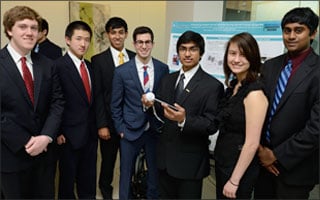BME team wins 2014 DEBUT challenge with AccuSpine probe

The National Institute of Biomedical Imaging and Bioengineering — part of the National Institutes of Health — has selected a team of Johns Hopkins Biomedical Engineering undergraduates as its first place winner of the 2014 Design by Biomedical Undergraduate Teams (DEBUT) challenge, The BME design team, who presented their project at Johns Hopkins Design Day in May 2014, was awarded a $20,000 prize for their AccuSpine pedicle probe.
Judging for the competition was based on four criteria: the significance of the problem being addressed; the impact on clinical care; the innovation of the design; and the existence of a working prototype
The AccuSpine pedicle probe was designed by eight undergraduates: Clay Andrews, Eric Xie, Adarsha Malla, Bradley Isaacs, Anvesh Annadanam, Erica Schwarz, Ravi Gaddipati and Ravi Gaddipati and Luis Herrera. Their project began in July 2013 as part of a Center for Bioengineering Innovation and Design design team class. The goal was to address a clinical need for an effective guidance system for the safe and accurate placement of screws within the spine during spinal fusion surgeries as treatment for various spinal deformities.
The team worked through several prototypes, conferring with a consortium of spine surgeons at the Johns Hopkins Hospital, before arriving at the current probe model. Johns Hopkins Hospital chief clinical sponsors for the project were Dr. Chetan Bettegowda, Assistant Professor of Neurological Surgery; and Dr. Sheng-fu Larry Lo, Assistant Resident, Neurosurgery. Other Hopkins’ collaborators included: Dr. A. Jay Khanna, Professor of Orthopedic Surgery and Biomedical Engineering; Dr. Allan Belzberg, Associate Professor of Neurological Surgery; and Dr. Ziya Gokaslan, Professor of Neurological Surgery.
The result is the AccuSpine pedicle probe — a self-contained solution designed to enable safe and accurate pedicle screw placement by providing real-time feedback to the surgeon. The device uses vibration and flashing LED lights to warn when a breach is detected. It offers peace of mind in the operative outcome, a higher standard of care, and reduced intra-operative radiation exposure.
In addition to the first place in the NIH DEBUT Challenge, the team has received a flurry of awards for their concept, including first place in the CalState Fullerton Business Plan Competition, first place at the Johns Hopkins Business Plan Competition (medical technology undergraduate category), and first place at Drexel Business Concept Competition. The team also received the Dr. Abdi Zaltash award for technology that shows great promise at the ASME iShow.
The team has formed a startup medical device company, White Light Medical, and seeks to gain funding through grants and investors in order to begin production of a cost-efficient AccuSpine probe.
